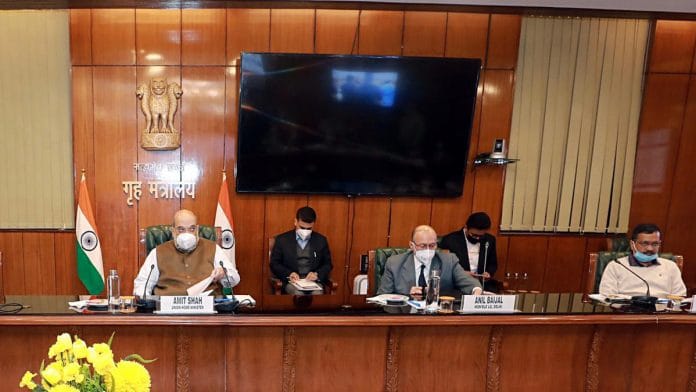New Delhi: For the second time since the Covid-19 pandemic began, Union Home Minister Amit Shah met Delhi Chief Minister Arvind Kejriwal Sunday to address the surge in cases. The meeting, which lasted over an hour, resulted in key decisions such as increasing testing and making more beds available in the national capital.
Speaking to the media after meeting Shah, Kejriwal said Delhi will conduct between 1 and 1.25 lakh tests a day, and the central government and the Indian Council of Medical Research will provide cooperation. He also said the Union government has assured that it will provide 750 more ICU beds at the DRDO Centre to make up for the shortage of beds in Delhi.
Kejriwal said another meeting will be held by the Ministry of Home Affairs Monday to take a decision regarding re-imposition of restrictions in the national capital.
Union Health Minister Harsh Vardhan, a senior BJP leader from Delhi, also attended the meeting chaired by Shah, as did Lieutenant Governor Anil Baijal and Delhi Health Minister Satyendar Jain.
Delhi recorded 3,235 fresh Covid-19 cases Sunday, taking the infection tally to over 4.85 lakh. The death toll also rose to 7,614, with 95 more fatalities registered Sunday.
Amit Shah, in a series of tweets, also shared key outcomes of the meeting. He said the number of RT-PCR tests will be doubled, and that ICMR’s mobile testing vans should be used wherever required. The home minister also said the containment strategy needs to be looked into, and asked for a detailed inspection of Covid-19 wards to ensure proper facilities are being provided to patients.
आज बैठक में विभिन्न निर्देश दिये।
1) सर्वप्रथम दिल्ली में RT-PCR टेस्ट में दो-गुना वृद्धि की जाएगी।
2) दिल्ली में लैबों की क्षमता का अधिक से अधिक उपयोग करके, जहां कोविड होने का खतरा ज़्यादा है, वहां स्वास्थ्य मंत्रालय तथा ICMR की मोबाइल टेस्टिंग वैनों को तैनात किया जाएगा।
— Amit Shah (@AmitShah) November 15, 2020
Shah also said doctors and paramedical crew from the Central Armed Police Forces will be flown into Delhi to enhance capacity.
8) केंद्रीय सशक्त पुलिस बलों ने कोरोना से लड़ने में देश और दिल्ली की जनता का बहुत सहयोग किया है।
मोदी सरकार ने दिल्ली में स्वास्थ्यकर्मियों की कमी को देखते हुए CAPF से अतिरिक्त डॉक्टर और पैरा मेडिकल स्टाफ देने का निर्णय किया है, उन्हें शीघ्र ही एयरलिफ्ट करके दिल्ली लाया जायेगा।
— Amit Shah (@AmitShah) November 15, 2020
In cases of severe Covid-19 infection, protocols are to be prepared to allow plasma donation, he added.
10) गंभीर कोरोना मामलों में प्लाज्मा डोनेशन और प्रभावित व्यक्तियों को प्लाज्मा प्रदान किए जाने के लिए प्रोटोकॉल तैयार करने के निर्देश दिए।
डॉ. वी के पॉल, निदेशक एम्स और महानिदेशक ICMR के नेतृत्व में एक उच्च स्तरीय समिति इसपर जल्द ही रिपोर्ट देगी।
— Amit Shah (@AmitShah) November 15, 2020
Also read: Pollution, festivities, onset of winter — why Delhi is seeing its ‘third wave’ of Covid
Why the meeting was held
The meeting was convened to devise a strategy to contain the spread of the coronavirus in Delhi amid the festive season, decreasing temperatures and rising pollution. However, officials who attended the meeting confirmed that there was no discussion regarding the rising pollution levels.
On 2 November, a meeting convened by Union Home Secretary Ajay Kumar Bhalla had attributed the third wave of Covid cases in Delhi to festivals and a greater movement of people, accompanied by laxity in adhering to the basic principles of Covid-appropriate behaviour.
The long festive season — starting with Navratri, Durga Puja and Dussehra, and now Diwali and Chhath Puja — has resulted in an increase in gatherings and crowding of marketplaces, and seems to have had a hand in Delhi’s Covid spike. In fact, the National Centre for Disease Control had warned that Delhi needed to be prepared for about 15,000 fresh Covid-19 cases per day, taking into account the winter-related respiratory problems, a large influx of patients from outside and festive gatherings.
The meeting chaired by Bhalla had resolved that efforts would be made for testing, contact-tracing and treatment, especially in the critical zones, and emphasised that travel by Delhi Metro should be carefully regulated, in accordance with the standard operating procedures.
Sunday’s 3,235 cases were detected from 21,098 tests conducted the previous day, with the Delhi health department’s bulletin issued Saturday pointing out that the positivity rate increased to 15.33 per cent.
The national capital had recorded its highest single-day spike of 8,593 Covid-19 cases last Wednesday, while 104 fatalities were recorded the next day. According to the health bulletin, the tally of active cases rose to 44,456, while the recovery rate stood at over 89 per cent. The number of containment zones in Delhi was 4,288 as of Saturday.
2nd time Centre has stepped in
In June, when the number of Covid-19 cases was on the rise in Delhi, Amit Shah had swung into action after the Delhi government’s handling of the crisis had faced flak from different quarters.
At that time too, there were complaints of non-availability of beds in hospitals, and difficulty in getting tests done in laboratories.
A committee set up by Shah also fixed the rates for testing and the number of beds, including ICU and isolation beds, in private hospitals.
In a meeting on 18 June, the home minister had said a common strategy should be framed for Delhi and the National Capital Region to tackle the pandemic, and added that Gurugram, Noida and Ghaziabad could not be separated from the national capital in this battle.
Also read: ‘Lockdown fatigue’ behind Delhi’s third Covid wave, experts call for behavioural change






